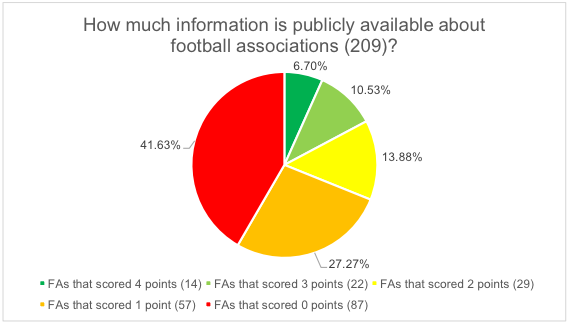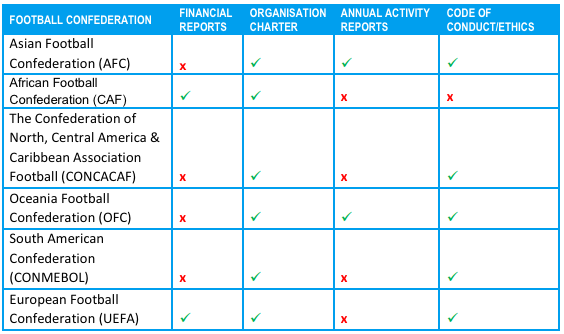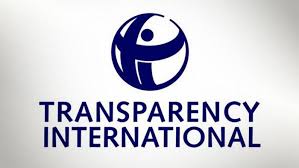By Paul Nicholson
November 19 – Transparency International has released a report it is calling its Football Governance League Table. While this is strictly not a league table as there is no ranking, the report highlights an uncomfortable lack of public transparency in national federation accounting with 81% of federations having no financial records available.
The report was compiled by researchers using the publically available information on websites and backed up with emails to federations asking for links to information.
Of FIFA’s 209 international federations, 21% do not have a website, while 85% of FA’s publish no activity accounts of what they do.
“We wanted to find out how transparent they are about the money they receive from FIFA and their other revenues. Many of the FAs and the confederations have income from sponsors, broadcasting licenses, ticket sales, international matches and other sources in addition to the funds for FIFA. While they prominently display the logos of their sponsors on their homepages, little to no information is provided on the value of these deals and activities,” says the report.
Transparency International says that only 14 “football associations publish the minimum amount of information necessary to let people know what they do, how they spend their money and what values they believe in.”
Of that 14 that meet Tranparency Internatonal’s criteria, 12 are in Europe, one in Asia and one in North America – and interestingly it is not the anti-corruption campaigning US federation.
The research divided information into four categories based on the Transparency International Business Principles for Countering Bribery. The organisation says that this is the basic information that should be available for organisations in order to monitor their governance and standards: financial accounts, codes of conduct, charters/statutes and information on activities. One point was given for each of the
four categories with the result being that a stunning 42% (87) of FIFA’s member associations scored zero points – meaning they do not publish any relevant information about their organisations.

The table below shows a rough breakdown of how much public information is publicly available by confederation. Noticeable here is that only two out six confederations make their financial accounts publicly available.

Commenting on the report, Chris Eaton, the Executive Director for Sport Integrity at the ICSS said: “While the world focuses on FIFA in football, Transparency International reminds us all that FIFA is absolutely not all of football, and simply that all of football needs governance reform, not just FIFA.
“We would expect that the FIFA Reform Committee will not only consider the Transparency International table on football governance, but also consider what options FIFA realistically has to direct and manage not only reform of itself, but of Confederations and National Associations. This is a critical question. Even though we do not yet have a detailed blueprint of FIFA reform, the very fact that reform is necessary extends well beyond FIFA in football governance, and ultimately even beyond Transparency International examination, to Leagues and Clubs.”
In its recommendations, Transparency International says: “Where there is a lack of information there are heightened corruption risks. The arrests of FIFA executives and their business partners have made the world aware of the corruption that can become systemic, even in football.
“FIFA, football confederations and FAs must become more transparent and accountable. That means publishing relevant and basic information about their activities and allowing independent verification of that information.
“Transparency International believes FAs and Confederations should make information publicly available about their operations, finances and core values. If football organisations incorporate best anti-corruption practices into how they operate they can begin to win back trust among fans, limit the scope for bribery and corruption, and help in the fight against match-fixing.”
Transparency International recommends a five-point plan for FIFA:
1. FIFA should mandate through a change in its statutes that all its members must make publicly available the following information as a pre-requisite for membership and financial assistance: audited financial accounts, an annual activities report, code of conduct/ethics and organisational statutes.
2. FIFA’s Audit and Compliance Committee should develop minimum standards on the content of charters, codes and reports, and should monitor associations’ fulfilment of these requirements on an annual basis as a precondition to the disbursement of annual FIFA funds to associations.
3. The FIFA website should also collect and make easily accessible all charters and annual activity and financial reports of associations on its main website.
4. The six regional football Confederations should commit to publishing the same level of relevant operational information as the football associations on their websites, including codes of conduct.
5. FAs and Confederations should have independent oversight on their boards, including non-executive directors, tasked to ensure the organisations adhere to basic standards of transparency and accountability.
The release of the report comes on the same day that the Francois Carrard’s FIFA Reform Committee meets in Zurich. How far those meetings are influenced by the recommendations in this report remain to be seen but they will doubtless add some spice to their deliberations with some of those sitting on the committee coming from federations that come up woefully inadequately in the report.
View the full report at http://www.transparency.org/whatwedo/publication/football_governance_league_table
Contact the writer of this story at moc.l1735059074labto1735059074ofdlr1735059074owoed1735059074isni@1735059074noslo1735059074hcin.1735059074luap1735059074

